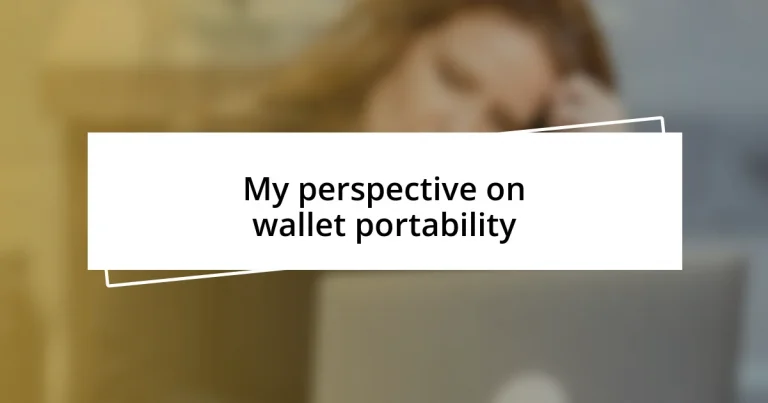Key takeaways:
- Wallet portability enhances convenience, allowing users to manage multiple financial tools seamlessly and securely from various devices.
- The future of wallet portability is poised for advancements with biometric security features and integration of various personal documents, enhancing user experience.
- Different types of portable wallets, such as digital, hardware, and smart wallets, each cater to specific needs, promoting better organization and security in daily transactions.
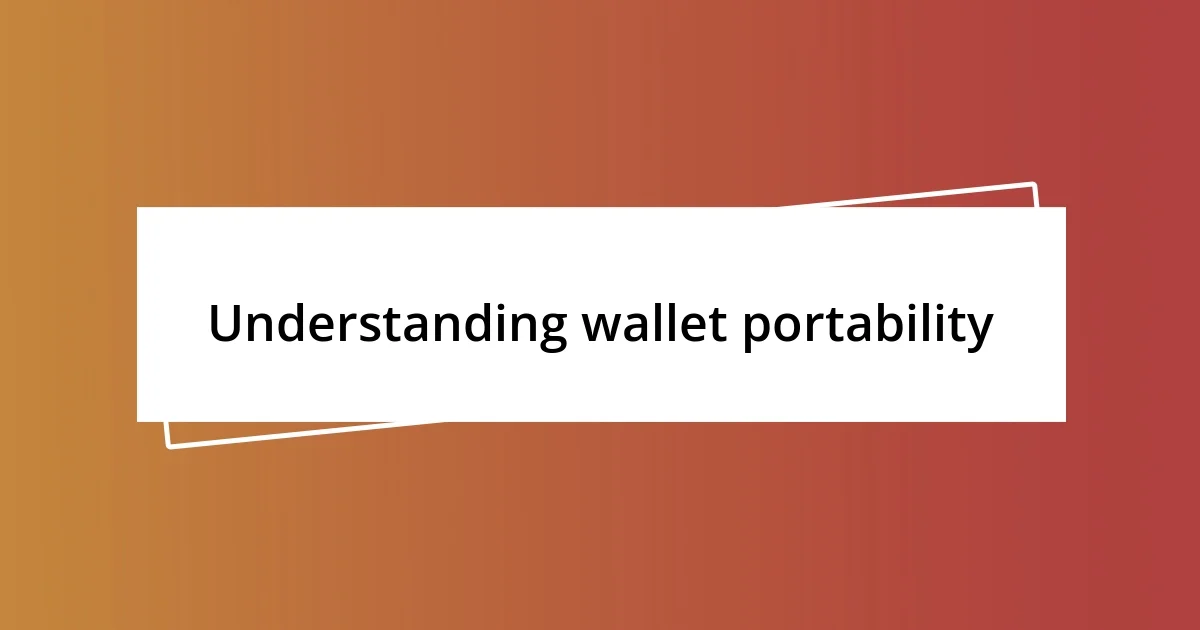
Understanding wallet portability
Wallet portability refers to the ability to use one wallet across various platforms and devices without losing essential features or information. I remember the first time I switched from my old wallet to a digital one; it felt liberating but also a bit daunting. Could I access all my cards and accounts seamlessly? The beauty of wallet portability lies in its promise of convenience, allowing you to streamline transactions and manage your finances effortlessly.
When you think about it, wallet portability isn’t just about convenience; it’s about empowerment. With a portable wallet, you can carry the essentials that matter most—whether that’s digital currencies, loyalty cards, or even personal identification—all in one place. I often find myself juggling multiple payment methods, and it’s frustrating when they don’t sync up. How much easier would it be if all my financial tools played nicely together?
The emotional aspect of wallet portability hits home when I think about security. It’s reassuring to know that I can have multiple layers of protection for my financial information, yet still access everything from my phone. Have you ever had that sinking feeling when you misplace your wallet? It’s nerve-racking! But with a portable wallet, I can feel more secure, knowing that my data can be managed and backed up digitally, reducing the chances of loss.
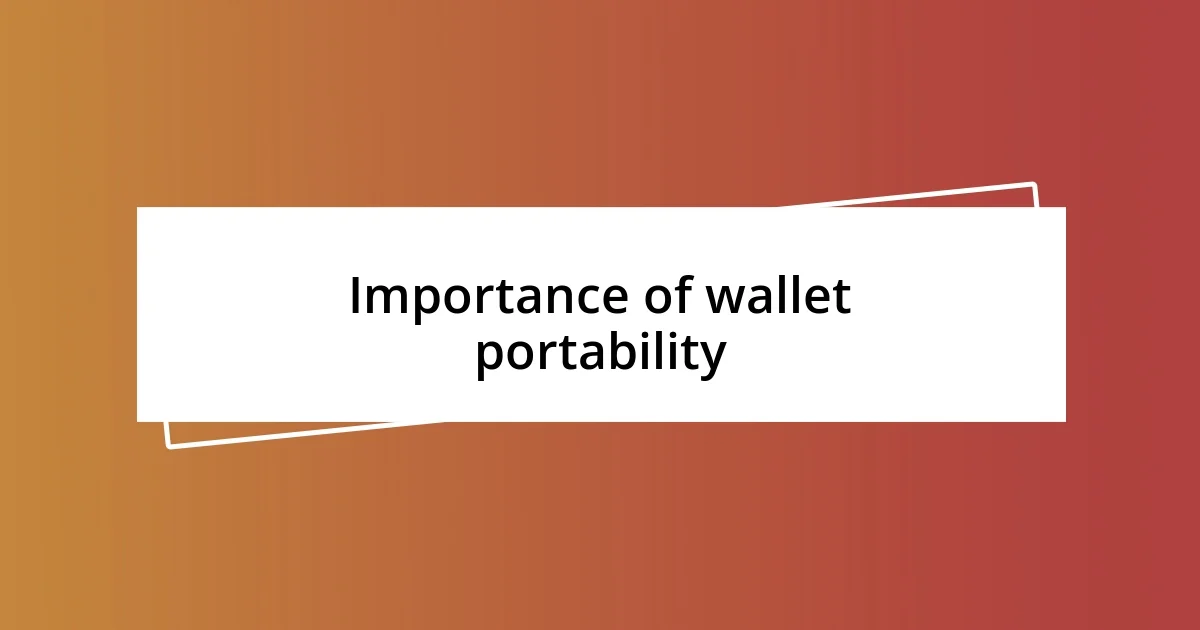
Importance of wallet portability
Wallet portability is crucial in today’s fast-paced world. For instance, I once found myself at a friend’s wedding, scrambling to find my invitation amidst all the digital options on my phone. It struck me how annoying it was to have multiple apps and accounts to manage, yet if my wallet was more unified, I could have accessed everything—RSVPs, payments, and more—in one place. This capability not only enhances our efficiency but also reduces the stress of handling various financial tools.
Consider how often we rely on fast transactions. From groceries to online shopping, having a portable wallet allows for a seamless experience that can save us time and, let’s face it, frustration. I recall a time when I had just a physical wallet on me, and fumbling through it at the register felt like an eternity. The convenience of wallet portability is what we need; it speeds up the process, making every purchase much more enjoyable.
Moreover, the emotional relief that comes with wallet portability cannot be understated. I remember losing my wallet a few years back, and that panic was overwhelming. The thought of lost cards and accounts sent chills down my spine. With a portable wallet, that worry dissipates; I can manage my accounts digitally, ensuring that even if I lose access to my physical wallet, I can still recover my information easily. It’s about turning a stressful situation into a manageable one, showcasing the true significance of portability.
| Aspect | Importance of Wallet Portability |
|---|---|
| Convenience | Streamlines access to multiple financial tools |
| Time-saving | Speeds up transactions and reduces wait times |
| Emotional Security | Reduces anxiety related to losing financial information |
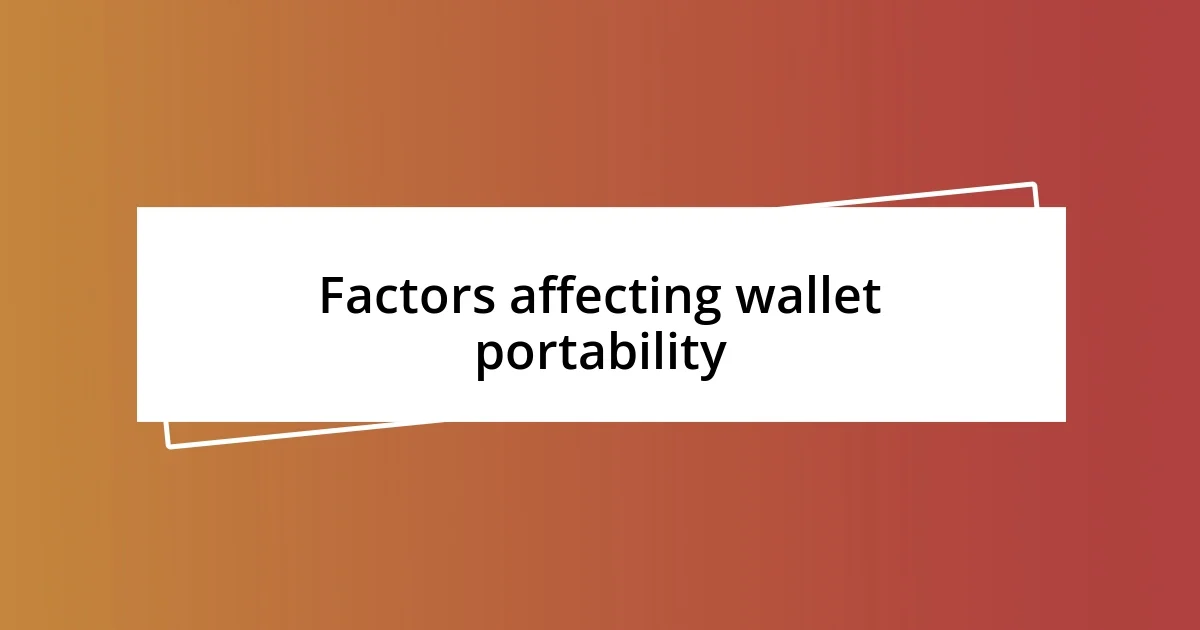
Factors affecting wallet portability
When considering wallet portability, various factors come into play that can enhance or hinder the user experience. For instance, the compatibility of a digital wallet with existing platforms significantly affects its utility. I’ve often been frustrated when a new payment app I wanted to try didn’t mesh well with the ones I was already using. This lack of integration can create roadblocks, making users hesitant to fully embrace wallet portability.
- Compatibility with Devices: Whether on smartphones, tablets, or smartwatches, a wallet must work across all platforms.
- Security Features: Strong encryption and authentication methods are essential for user trust.
- User-Friendliness: An intuitive design makes accessing features quick and effortless, which is critical during hurried transactions.
- Support for Multiple Currencies and Cards: The ability to store various financial tools, from loyalty cards to cryptocurrencies, matters greatly.
I also believe that user trust plays a vital role in wallet portability. Reflecting on my own experience, I tend to shy away from wallets that seem to have flimsy security measures. I remember reluctantly trying out a new app, but the nagging doubt about data breaches made me uneasy. Trust is cultivated through robust security and a transparent user experience, which can either encourage or deter adoption.
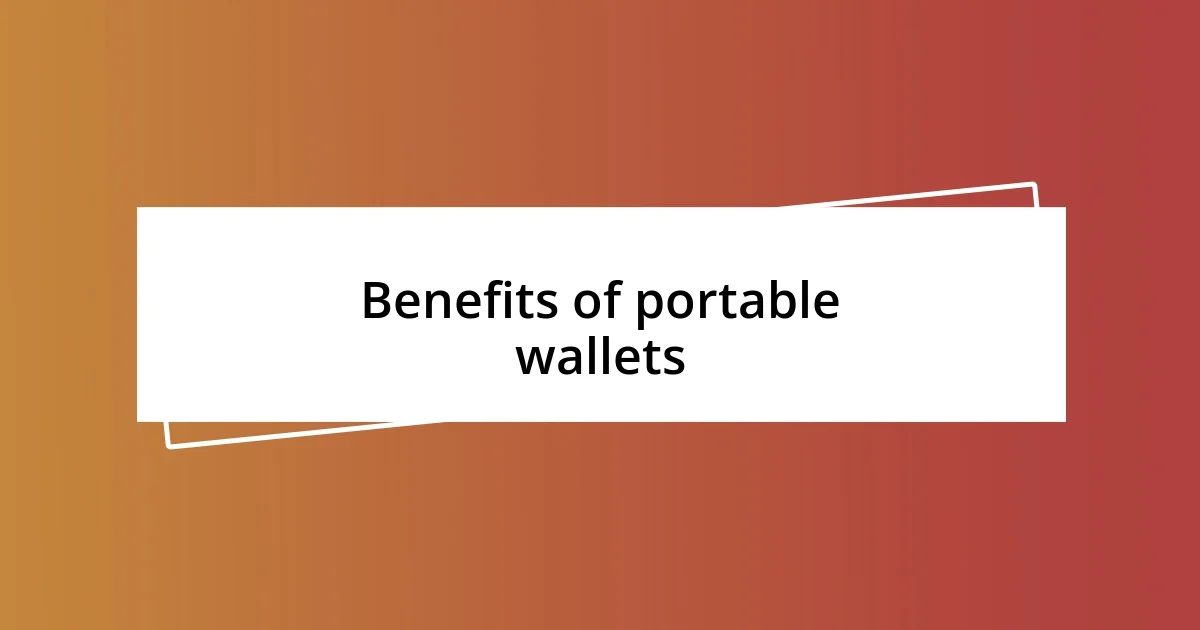
Benefits of portable wallets
Having a portable wallet can significantly simplify our day-to-day transactions. I cannot stress how liberating it felt the first time I made a purchase by simply tapping my phone against a register. That seamless experience reminded me of how technology should work—effortlessly—and it saved me from fumbling around with cash or cards. It’s not just about convenience; it’s like having a personal assistant right in my pocket.
Another key benefit is the organization it provides. I frequently use loyalty cards at various stores, and keeping track of them was a headache. Once I switched to a digital wallet, I gathered all my cards in one place, making it easy to access any time. Have you ever felt that rush of satisfaction when everything is just where you need it? I know I have. This digital organization smooths out shopping trips, allowing me to focus on what truly matters—like enjoying my time with friends or family.
Let’s also talk about security, which is paramount when it comes to handling personal information. Transitioning to a portable wallet has granted me a level of peace I didn’t know I needed. I remember when I lost my card after a night out; the anxiety of possible fraudulent charges kept me up. Now, knowing that my information is encrypted and that I can instantly lock my wallet if something goes wrong gives me confidence. Isn’t it reassuring to think that a few taps can bring this level of control and security back into our lives?
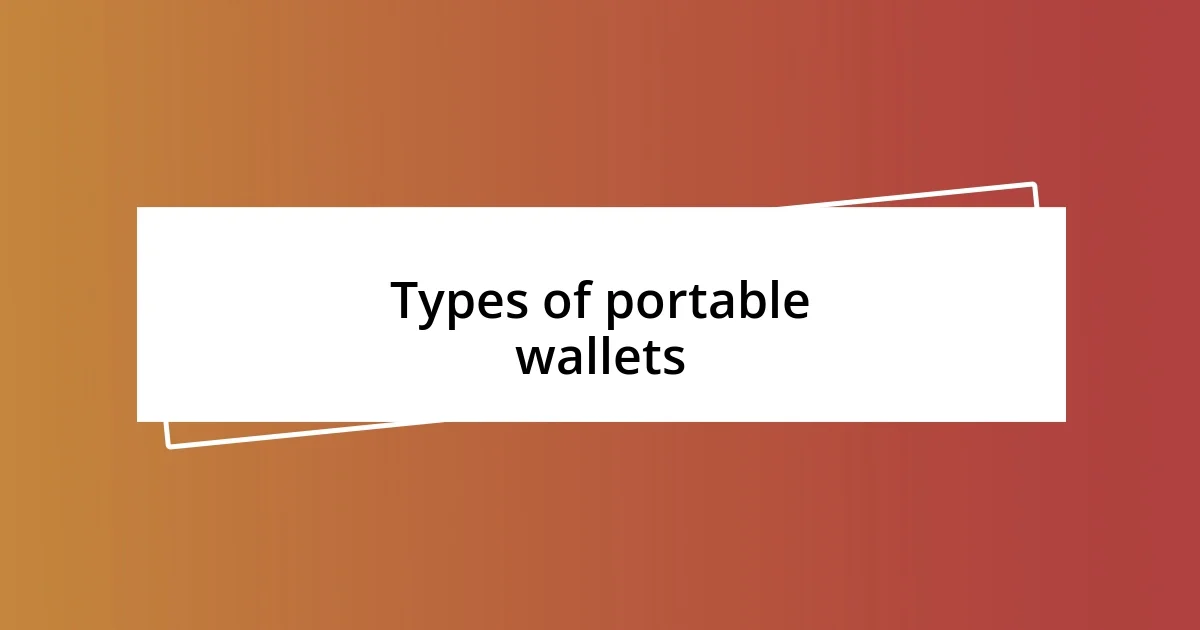
Types of portable wallets
There are several types of portable wallets, each featuring unique characteristics suited for different user preferences. One popular choice is digital wallets, such as Apple Pay or Google Wallet, which allow you to store payment information securely on your smartphone. I remember the first time I used Apple Pay; it felt like stepping into the future, tapping my phone instead of rummaging through my bag for my debit card. It gave me a sense of ease and efficiency that traditional wallets just couldn’t match.
Another type that deserves attention is the hardware wallet, primarily used for storing cryptocurrencies. Having dabbled in a bit of crypto myself, I opted for a hardware wallet for its heightened security features. I still recall that sense of relief knowing my digital assets were stored offline, far from potential hackers. The peace of mind it provided was invaluable, especially in a landscape teeming with online threats.
Lastly, there are smart wallets, which blend traditional wallet functionality with tech features like Bluetooth tracking and built-in chargers. I vividly remember shopping on a busy weekend when my smart wallet buzzed in my pocket, alerting me that I had left my card behind. That little alert spared me a frustrating moment and made me appreciate how technology can truly enhance our daily transactions. Do you ever wonder how life would look without these innovations? I can say, from experience, it would feel a lot more chaotic.
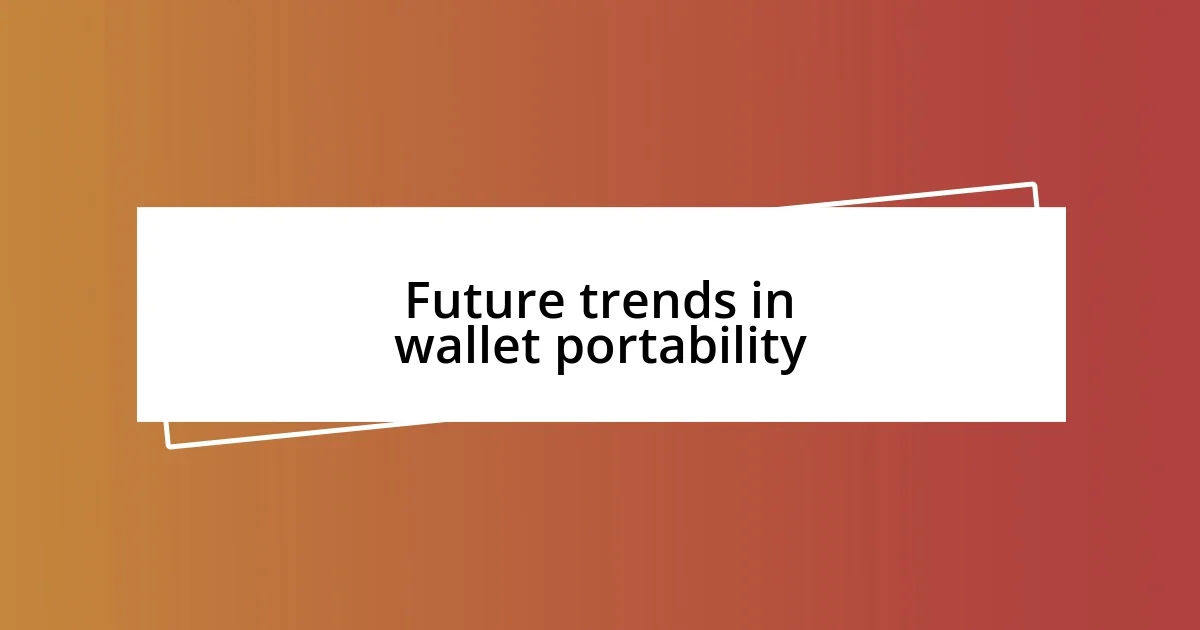
Future trends in wallet portability
The future of wallet portability is undoubtedly heading toward an even more seamless integration of technology in our daily lives. I envision a time when digital wallets will not only store payment methods but also include our IDs, insurance cards, and even boarding passes. Can you imagine the simplicity of not having to pull out multiple cards at the airport? For me, the thought of having everything ready at my fingertips is not just efficient, it’s exciting.
Looking ahead, biometric security features will likely play a pivotal role in wallet portability. I find the idea of using facial recognition or fingerprint scanning to complete a transaction incredibly appealing. It removes the need for remembering a pin or searching for my phone. My experience with biometrics in smartphones has been largely positive, and the convenience and security it provides would enhance the appeal of portable wallets even further. Doesn’t it feel good to know that your wallet could become an extension of who you are?
Lastly, as virtual and augmented reality technologies evolve, I can’t help but wonder how they will transform the wallet experience. Imagine walking into a store, and with a simple glance, your wallet pops up with all your loyalty points and offers, ready to go. In my mind, this level of interaction would make shopping not just easier, but way more engaging. Have you ever daydreamed about such a futuristic shopping experience? For me, it would make each trip feel like an adventure rather than a chore.












